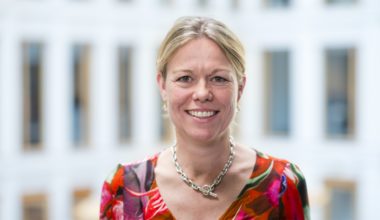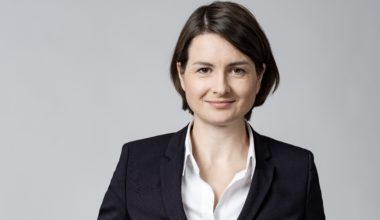As part of our exclusive series in partnership with TOC Digital, INFORM’s Matthew Wittemeier caught up with Beth Maundrill, Editor-in-Chief at Port Technology International, to get a sneak peek at her views on being a millennial in maritime. From how she found her way into the industry to what it is like to work in it on a daily basis, Beth gives us insight into what we can expect to explore in the upcoming TOC Digital Millennials in Maritime People session (#MiM20People).

MW: Beth, how did you start working in maritime? What attracted you to the industry?
BM: I’ve been in business-to-business publishing since leaving university, so it’s been about seven years now. Previously, I was working in the defense and aerospace realm, and, having done that for quite a number of years, I wanted to explore a new industry and something outside of defense. Maritime’s got some similarities in some of the technologies that have been explored, so while it wasn’t a huge shift away from what I was used to, it was something new that I could sink my teeth into. Immediately, I realized that Maritime is a fundamentally everlasting industry that will always be important globally.
MW: You’ve been in the industry now for nearly a year, if I understand correctly.
BM: Yeah, about eight months now.
MW: What surprised you the most about the industry that you didn’t see coming?
BM: So, my first introduction to the industry was actually at the Smart Digital Ports Conference in Rotterdam, which Port Technology hosts. Compared to my experience at defense conferences, I really saw that it was a different group of people. While there were some similarities, and I think bearing in mind what we’re kind of discussing here today, the lack of millennials, but I think what I was surprised to see a positive mix of females in the industry at a relatively high level and a diversity in nationalities present. I can remember that being one of the most surprising things, and that was kind of straightaway.
Another surprising thing is, obviously, I had a preconception of the maritime industry as being relatively slow and sluggish. Actually, when you look into it, the technologies and concepts that organizations are exploring are thought-leading in the same way that I’d seen in defense, for different reasons obviously, but it is a really forward-thinking industry.
MW: Let’s talk a bit about what we’re here to talk about, which is millennials. So, you, yourself, are a millennial.
BM: Yep. I fall into that category.
MW: How would you typify the generational mix at Port Technology?
BM: Port Technology International is quite a small, close-knit team and I think we’ve got a good range of ages within the team. The senior management of the company overall are obviously a lot more mature. I wanted to avoid saying “older,” but they obviously are. When you get to that level, of course, that’s going to be the case, because getting to those positions comes with experience.
Regarding the team, I think we’re a good mix. There are a couple of millennials and a few people from Generation X. It’s a good mix of males and females as well. So, we’re kind of getting perspectives and experience from across the board.
MW: What was it like integrating into that highly diverse team?
BM: I’d worked at my previous company for quite a number of years. So, for me, integrating was a challenge because I had to let go of some of the old working practices that I was really used to. I think, in a way, that kind of taught me to step back a bit and just watch what’s going on rather than bullishly coming in and trying to change things. Then, when I’d learned exactly what was going on, I could confidently make suggestions for change.
I’d been brought in on the premise that I would “shake things up” on the editorial side – kind of bring in new ideas. So, as well as having to take a step back and watch what was actually going on, it was also good for me to be able to come in with an objective view, bring in some new working practices, new workflows, and new ideas. That was kind of the biggest challenge, just making that balance suitable to present myself in the best way.
MW: What’s it like inside the team with all of that change happening? It sounds like you, in a way, have been a catalyst for some of that change.
BM: I think at the beginning, change is always scary. It was just working out how to best implement it in setting our expectations at the right level. I would say my rhetoric is very much “slow and steady will win the race.” So there’s still changes happening.
MW: That’s not a traditional millennial view. There is a stereotype that we hit the problem head-on, if you will.
BM: Yeah, I think it is about evaluating things a little bit more carefully. If you go at things really hard and really quickly, from my personal experience, you can trip up and waste time. I’ve seen that happen before. I’d rather do things well the first time rather than having to repeat them.
MW: How has your team workplace changed in response to COVID-19?
BM: Obviously, there are changes that have happened across the board, but you can take working at home as a case study. I’ve thought about this in terms of our team, and obviously I’ve mentioned our management team is a bit more experienced, more senior. Before COVID-19, they were quite resistant to working from home and those kinds of changes that, as millennials, we’re very used to and we kind of almost expect now. We’ve seen that totally flipped on its head, and it’s been really positive. Our senior management is now thinking, “Why will we ever go back to the office full time?” They’re obviously a few generations ahead of adopting some of those mentalities. So, it will be interesting to see what other mentalities are picked up from this shakeup that we’ve all been experiencing.
MW: I entirely agree, and we’ve seen similar things here at INFORM. It is great to see maritime organizations keeping pace with the world as it changes around us. Let’s pivot a bit. What keeps you going back to work day in and day out? What gives you the most satisfaction or value?
BM: I don’t know whether this sounds a bit cliché, but doing a good job, especially when you’re working on editorials like I am. Day in and day out, you want stuff to be good because it’s got your company’s name on it. And my name, Beth Maundrill – it’s got that on it too. Just this morning, I was writing some stuff, and it just gives me such a boost when I’ve written a good piece that readers will find interesting. You send it to a colleague, and they say it’s well written. You make the changes that need to be made, and then you see people are actually reading it, engaging with it, whether that’s on social media or sending you an email saying, “Oh, can we follow up with this?”
I think that’s something that definitely keeps me going. Also, I know we’re all working from home, but I’m still collaborating with my teammates and working with new people and encouraging them. I’m just getting to know this industry, and that is really kind of keeping me going.
MW: Closing thoughts now – What’s your one piece of advice that you would pass on to the Baby Boomer generation, who are currently at the helm of many maritime organizations today?
BM: Be open to change and don’t focus too much on the stereotypes that the media portrays about different generations. Accept people for the skills that they’ve got, because millennials have been in the workforce for quite a long time now. I think there is definitely a desire not to lean on those stereotypes, but they can certainly creep in, and as with all generations before this and in the future, we will eventually be at the helm.
It’s important to prepare the younger generation as best you possibly can so that the industry continues to move forward. There’s a good pool of people to select from when you’re looking at management hires or moving people up the pole, and the port industry does need to work on attracting those younger employers so that there isn’t an issue down the line when there’s not a big enough pool of skilled people.
MW: Thank you so much, Beth. I know we’re all looking forward to sitting down with you on the full Millennials in Maritime 2020 People panel discussion, where we can explore some of these concepts quite a bit deeper with you and the other panelists.
BM: Yeah, I’m looking forward to it. Thank you so much, Matthew.
Who is Beth Maundrill?
Beth Maundrill is Editor-in-Chief at Port Technology International and is based in London. Since completing her degree in politics and international relations at Reading University, Beth has worked in business-to-business publishing. At PTI, she oversees the production of the industry-renowned PTI Journal as well as hosting webinars, managing news coverage, and leading the editorial team. Before joining Port Technology International in 2019, she spent seven years in the aerospace and defense sector. She has experience covering international trade events, providing daily news coverage of industry developments, and working in a multimedia environment.
What is #MiM20People?
Building on the successes from the 2019 Millennials in Maritime (MiM19) panel, we’re back this year with an in-depth and focused look at millennials’ take on working in maritime. This is a must-attend session for any company looking to hire, integrate, and retain millennials on their teams.
To explore this topic, INFORM, in partnership with TOC Digital, has put together a multifaceted, multigender millennial panel to weigh in on the social issues of today and debate the millennials’ view of tomorrow. In short, millennials are now a central part of the world’s workforce, and their approach to work and broader social issues will define how companies act in the coming decade.


